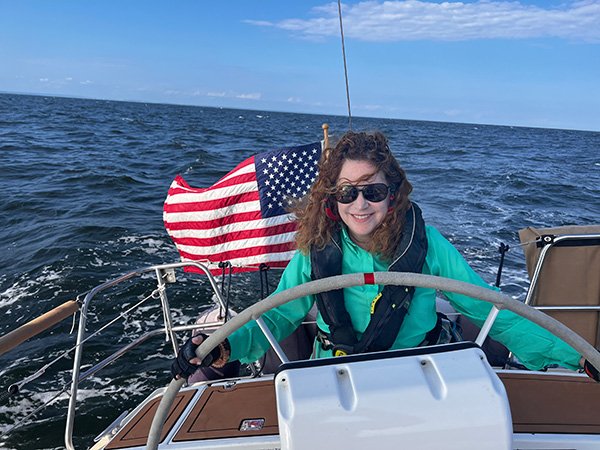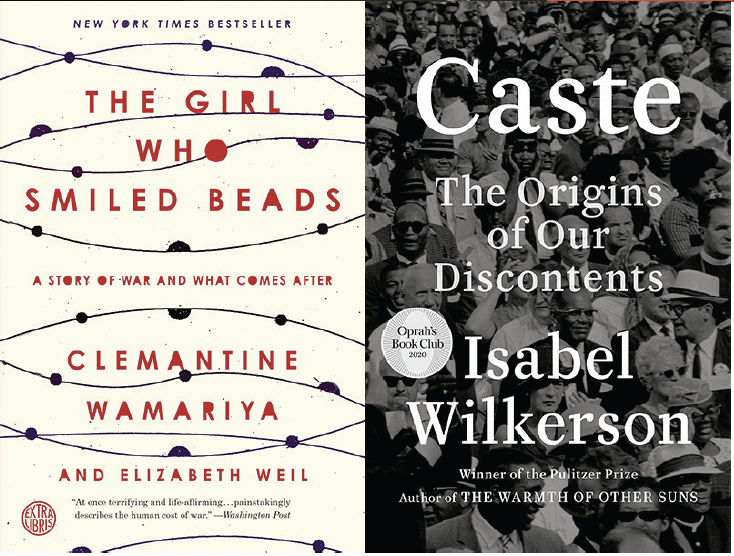2022: A Year of Reading Seriously
2022: A Year of Reading Seriously
By Randy Kaufman
with research assistance from Dustin Lowman
I didn’t plan to spend most of 2022 reading books about the darkness of the human spirit. But whether it was a coincidence or an unconscious effort to match the darkness of the year, that’s what happened.
What I thought was a random assortment of books read in the past year presents a tableau of my inner thoughts and fears. Darkness flooded my head and my heart. I worried about not only myself and my loved ones, but about democracy and humanity as we know it. My 2022 book journey was, in retrospect, a search for answers.
Winter
In January, I was upstate, surrounded by deer, turkeys, and the occasional bear, inhaling the glorious sunsets that inspired my blog. Vladimir Nabokov (Laughter in the Dark) was the first author of my year. He’s long been one of my favorite fiction writers. A roaring fire, with Nabokov at my side, was a perfect ending to many days.
On a frosty day at the end of January, toting a small trailer packed with ski equipment, food (human and canine) for emergencies, and two fullscreen monitors (an essential of life these days), my husband and I packed up our not-so-little Red Jeep with our two dogs. We were setting out for the west, to complete a cross-country road trip that had long been a dream of mine.
2 ½ days later, exhausted and exhilarated, we arrived at a rental house in Crested Butte, Colorado. After 3 frigid (think 12 below) but sunny weeks, we were on the road again, driving North through Utah to Jackson Hole, WY. In our car, the driver controls the audio. For my husband, it’s comedy, some of which I enjoy, much of which I tolerate: Seth Meyers, Stephen Colbert, Trevor Noah, Jimmy Kimmel, Whitney Cummings, some old SNL clips.
For me, it’s books.
We covered 5,000 miles alternating between levity and gravity. My choices:
Leadership in Turbulent Times, in which Doris Kearns Goodwin brilliantly uncovers the lives and deaths of Lincoln, Theodore Roosevelt, Franklin Roosevelt, and Lyndon Johnson.
Humankind: A Hopeful History, the rare uplifting book of my 2022 collection, in which Rutger Bregman posits that we humans are far less evil than otherwise depicted.
12 Years a Slave: A True Story, in which Solomon Northup tells his unimaginable story of being captured and enslaved.
On the Shortness of Life, by Seneca. Perhaps summarized best by the book’s most famous quote: “It is not that we have a short time to live, but that we waste a lot of it.”
Still Writing: The Pleasures of Perils of a Creative Life, a memoir by Dani Shapiro.
Two days before my birthday, I skied blissfully on a bluebird day in Jackson Hole, honing my bump skills on a double black run. When I got back to the lodge, my exhilaration melted into dread: Vladimir Putin had invaded Ukraine. This catapulted me into a different mindset — one of war and destruction.
I feared ongoing social upheaval and was flooded with gratitude for my luck in being born a white woman in America to the most loving parents imaginable. I wondered, for the umpteenth time since the dawn of the Trump era, whether this was the end of civilization as we know it. What would my life be like should that happen? Would I survive? Could I survive?
I reached for Free: A Child and a Country at the End of History, Lea Ypi’s memoir of living through the end of Communism in the Balkans as a child. Her questions and her quest resonated.
Well into March, as the war raged on. I felt the pull of one of my favorite authors. In her novel Violetta, Isabel Allende beautifully tells the story of Violetta, a woman born in 1920, who lived a life touched by two world wars, the Spanish Flu, the Great Depression, the suffrage movement, and COVID-19. Spurred on by this epic tale, I downloaded How to Speak, How to Listen, and quickly followed by another favorite author, Joan Didion’s Let Me Tell You What I Mean.
Spring
With the skis packed away, sailing clothes came out. We ventured down to Austin, TX for a sailing regatta. May weather remained cold and damp — as did my mood.
The thriving city and country music I expected to find disappointed. Homeless people on the streets made me feel as if I’d never left NYC. Signs in Austin asking people to leave their guns outside of restaurants served as a stark reminder of the near-constant mass shootings haunting our country, and the social divide we from which we suffer.
Searching still to understand what was happening to our world, I finally read Sapiens: A Brief History of Humankind by Yuval Noah Harari. I was hoping to find hope. The story, however, does not flatter our species. It reveals how the story of humanity may or may not be a story of progress — it all depends on what we do with our intellect and power. All civilizations end. Will ours end during my lifetime? Will it be by human hands? Have we sown the seeds of our own destruction?
Summer
Feeling the need to go even deeper and darker, I read Guns, Germs, and Steel, an exploration of why Eurasian civilizations dominate the world (spoiler: It has more to do with circumstance than any inborn traits). Then, moving from academic to actual, I devoured yet another memoir: Unbowed by Wangari Maathai, an extraordinary story of a woman who went from rural Kenya as a child, to founding the environmental Green Belt Movement in 1977, to winning a Nobel Prize.
Summer faded; I read Wind, Sand and Stars, by Antoine de Saint-Exupery, the author of The Little Prince, one of my favorite childhood books. You don’t have to be a flier to enjoy his accounts of air adventures, written in lyrical prose, sprinkled with philosophy.
Fall
As the sailing season drew to a close, one big adventure awaited: an overnight sailboat race from Stamford, CT to the Martha’s Vineyard Sound. Preparations took a month. We cleared the boat of all the wine, dog toys, and other non-essentials to make room for food and sleeping accommodations for our six-person crew. We up-armored the boat’s safety equipment for overnight sailing; I took a safety at sea class; I read Peter Isler’s Little Blue Book of Sailing Secrets. For the sailors among you, this is a must read. Leading up to the race, our definition of success was finishing — and we did, 36 hours later, all crew intact with smiles on our faces.
Following the race, we sailed one last time. On the final night — cold and windy at sea — we slept in the V berth in our clothes, snuggling with the dogs for much-needed warmth, to prove we could. Knowing we could, we tucked the boat away for the season, and I used my extra hours to resume my inner expedition to understand history and humanity:
If Nietzche Were a Narwhal and What Animal Intelligence Reveals About Human Stupidity by Justin Gregg
Home Deus: A History of Tomorrow by Yuval Noah Harari
The Righteous Mind: Why Good People Are Divided by Politics and Religion by Jonathan Haidt
Be Water, My Friend: The Teachings of Bruce Lee by Shannon Lee
Destiny of the Republic: A Tale of Madness, Medicine and the Murder of a President by Candice Millard
Barking up the Wrong Tree: The Surprising Science Behind Why Everything You Know About Success Is (Mostly) Wrong by Eric Barker
The Girl Who Smiled Beads: A Story of War and What Comes After by Clemantine Wamariya
The year ends. I am finishing the brilliant book Caste: The Origins of Our Discontents by Pulitzer Prize-winning author Isabel Wilkerson. I’m reminded of the end of Sapiens, where Harari depicts humanity as facing an unprecedented question: How do we want to shape the future of our species? AI is progressing at an exponential rate. Gene splicing is fast becoming a reality. Deep partisan divisions remain as the recent Georgia midterm race has shown. We are our own creations, and our creation is the future. To be a human in 2022 is to think — and read — carefully about what kind of future we want to create.
With all the grit, grace, growth and gratitude I can muster, I thank you for your support, and wish you good health, peace and joy in the coming year.
ABOUT THE AUTHOR
Randy Kaufman, formerly a corporate tax attorney and investment banker, is now a wealth advisor who prides herself on focusing on what matters most: clients’ peace of mind, family dynamics, and getting enough, not more. Randy is a passionate student of impact investing, strategic philanthropy, and behavioral psychology (while not a psychologist, she occasionally plays one in the boardroom). She is dedicated to helping the underprivileged, and is a proud member of global venture fund Acumen's advisory board. A thinker, learner, and pursuer of overarching truths, she is always eager to discuss big ideas about money, and its off-and-on associate, happiness.









